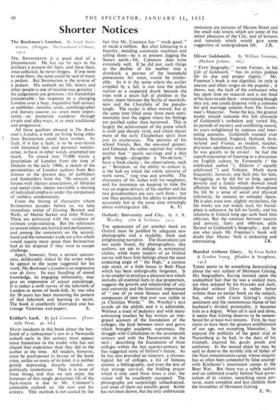Kiddar's Luck. By Jack Common. (Turn. stylePress. 95. 6d.)
MANY incidents in this book about the boy- hood of a railwayman's son in a Newcastle suburb early in this century must appear more humorous to the reader who has not shared that experience than they did to the author at the time. All readers, however, must be predisposed in favour of the book since, unlike so many of its kind, it is neither grittily depressing, drearily sordid, nor politically tendentious. That it is none of these things, and that we can enjoy the humours of this rough, penurious life of the back-streets is due to Mr. Common's admirable outlook on life now and his artistry. This outlook is not caused by the fact that Mr. Common has" made good," or made a million. But after labouring in a foundry,. mending automatic machines and selling shoes—he is at present digging the Sussex earth—Mr. Common does write extremely well. If he did ;tot, such things as the decline of his mother into a drunkard, a pawner of the household possessions for stout, would be intoler- able. As it is the scene where she, earlier crippled by a fall, is run into the police station as a suspected drunk because she trips with a pram full of children in the street, steers between the Scylla of mawkish- ness and the Charybdis of the pseudo- tough. The reader is often moved, but at the same time lifted away from mere senti- mentality into the region where his feelings are purified rather than harrowed. This is largely the achievement of the prose which is swift and sharply vivid, and which shares more of the early Elizabethan spirit than just its exuberance. The pictures of his school friends, Ben, the one-eyed gunner, and Edmund, the rather superior boy whose mother had "pearly ear-rings and a thin gold bangle—altogether a Ma-de-luxe," have a fresh clarity ; his observations, such as " Boredom, or the ability to endure it, is the hub on which the whole universe of work turns," ring true and sensible. The characters of his father with his roughness, and his insistence on keeping to time (he was an engine-driver), of his mother and his two grandmothers are very well done ; but one likes particularly his ability to generalise accurately but at the same time amusingly about working-class life. K. Y1


































 Previous page
Previous page